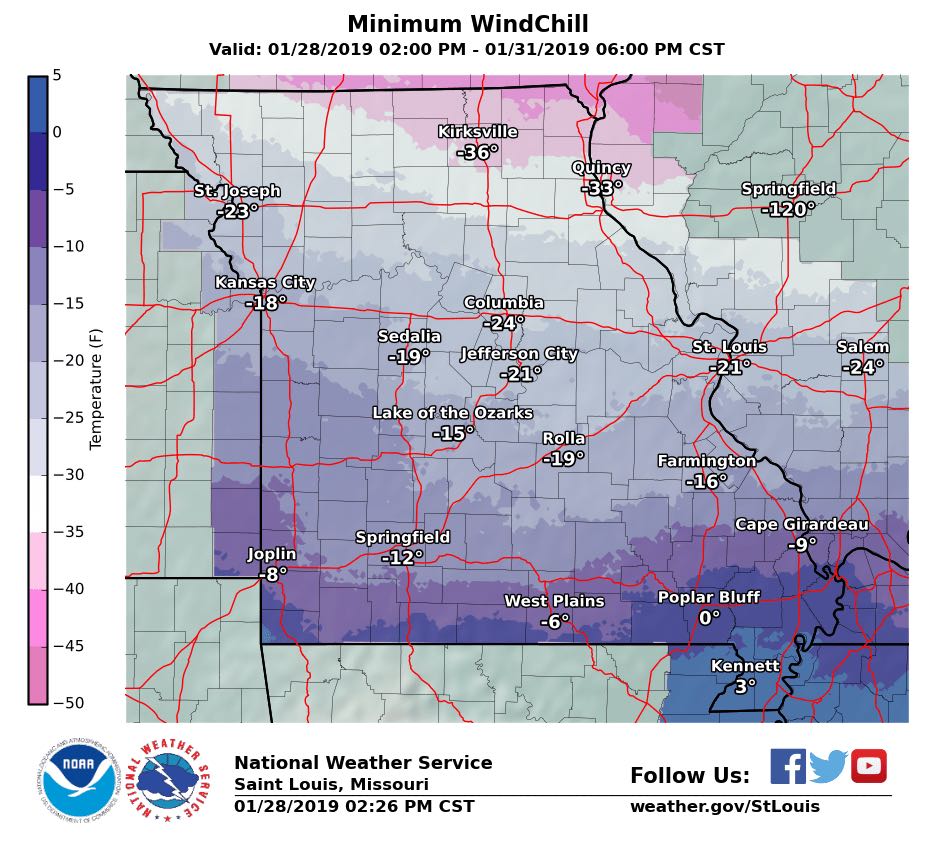According to a recent release, Governor Mike Parson is urging Missourians to understand the many hazards that come with the extreme cold that will overtake Missouri this week, and to take precautions to protect their families.
“We take the safety of our citizens very seriously and stand ready to support our local jurisdictions as they work to protect their communities,” said Governor Parson. “I also urge Missourians to check on neighbors who may need a little extra help during these dangerous conditions.”
The National Weather Service is predicting dangerously cold wind chill values of -5 to -40 degrees F across the state on Tuesday night and Wednesday morning. The most life-threatening wind chill values will occur across the northern half of the state on Tuesday night and Wednesday morning.
The National Weather Service is urging people to dress properly if they will be spending any time outdoors because such cold wind chill values will produce frostbite and hypothermia if precautions are not taken. People need to also remember that an unexpected vehicle breakdown could turn into an extremely dangerous situation if they are unprepared– remember to bring an extra set of warm clothing when traveling. Do not let the warmth of your vehicle give you a false sense of security.
The Governor advises Missourians to remember the dangers posed by space heaters and other supplemental heating devices many turn to in order to help heat their homes when temperatures plunge. As temperatures dropped in February 2015, seven Missourians died within five days in fires caused by supplemental heating sources. Nationally, space heaters lead to about one-third of home heating fires and about 80 percent of home heating fire deaths.
“Space heaters are potentially deadly if they are not monitored and used correctly,” State Fire Marshal Tim Bean said. “Ovens and stove tops should never be used to attempt to heat a home. Make sure you are not overloading extension cords and power strips, which are not designed for heavy electrical loads.”
The Governor said Missouri schools will be monitoring conditions to keep students, faculty, and staff safe. “We encourage parents to stay in close communication with school districts as weather conditions change. Families should know their local district’s policies about weather cancellations/delays. They can check district websites or contact their school office to be sure they know how to receive official notifications,” Commissioner of Elementary and Secondary Education Margie Vandeven said. “Please make sure children are dressed appropriately for the extreme cold.”
“The top concern of every Missouri farmer and rancher in the winter time is the safety and well-being of their livestock,” Director of Agriculture Chris Chinn said. “While our farmers and ranchers are braving the cold to care for their livestock and ensure their neighbors are okay, they should also remember to take care of themselves as temperatures drop.”
Missouri Department of Transportation officials advise motorists to winterize their vehicles with a good battery, a properly operating exhaust system, and oil that will withstand the rigors of cold weather. They should also test their antifreeze or have it tested by a professional to make sure it will not freeze in temperatures as low as 20 degrees below zero.
Travelers should make sure their gas tanks are full and have an emergency kit in each vehicle that contains snacks, water, phone chargers, blankets, flashlights, etc.
Below are some additional resources and winter safety tips to keep in mind:
– Warming centers in Missouri can be located at https://ogi.oa.mo.gov/DHSS/warmingCenter/index.html or dial 2-1-1 for United Way Referral.
– The state’s toll-free, adult abuse and neglect hotline (1-800-392-0210) can be used to report any elderly persons or adults with disabilities who may need assistance due to the cold.
– Turn off portable heaters whenever leaving the room or going to bed and have a three-foot “kid-free zone” around space heaters and fireplaces. Keep anything that can burn outside the three foot zone, too.
– Never overload extension cords or outlets. Never use an oven or other cooking devices to heat your home.
– Make sure all heating devices are properly ventilated, and always operate a generator outdoors and at least 20 feet away from any window, door, or vent in your home.
– Carbon monoxide is an odorless, colorless gas that can cause flu-like illness or death. Carbon monoxide poisoning can happen during extremely cold weather when individuals try warming their homes through unconventional methods. If you suspect carbon monoxide poisoning, call 911 immediately and get the victim to fresh air.
– If you do have to be outdoors, dress in several layers of loose-fitting, layered, and lightweight clothing. The space between these layers works as insulation to help keep you warmer.
– Protect your ears, face, and head. In addition to a hat, wear a scarf to help protect your lungs from cold air – it will also protect your ears and face.
– Watch for signs of frostbite and hypothermia:
– Frostbite causes a loss of feeling and pale or waxy white appearance of extremities, such as fingers, toes, ear lobes or the tip of the nose. Other signs may include numbness, a tingling or stinging sensation in the affected body part and reduced blood flow. If any of these symptoms are detected, please seek medical help immediately.
– The warning signs of hypothermia include uncontrollable shivering, memory loss, disorientation, slurred speech, drowsiness and apparent exhaustion. In infants, the skin will turn bright red and cold, and they may present with a very low energy level. If any of these signs appear, get the victim to a warm location immediately and call 911 for immediate medical assistance.
– Limit outdoor time for your pets. They are also susceptible to the extreme cold temperatures.


















